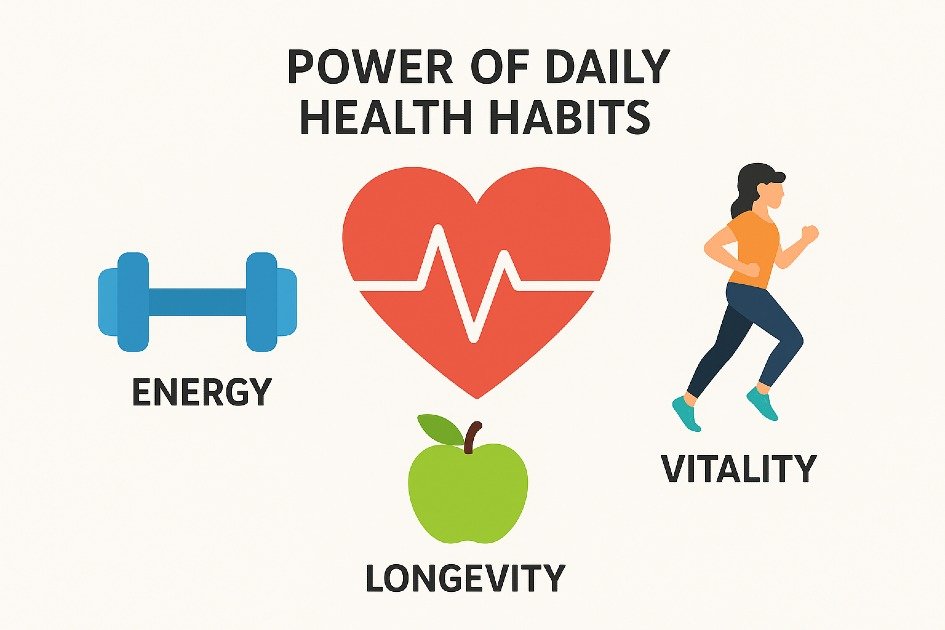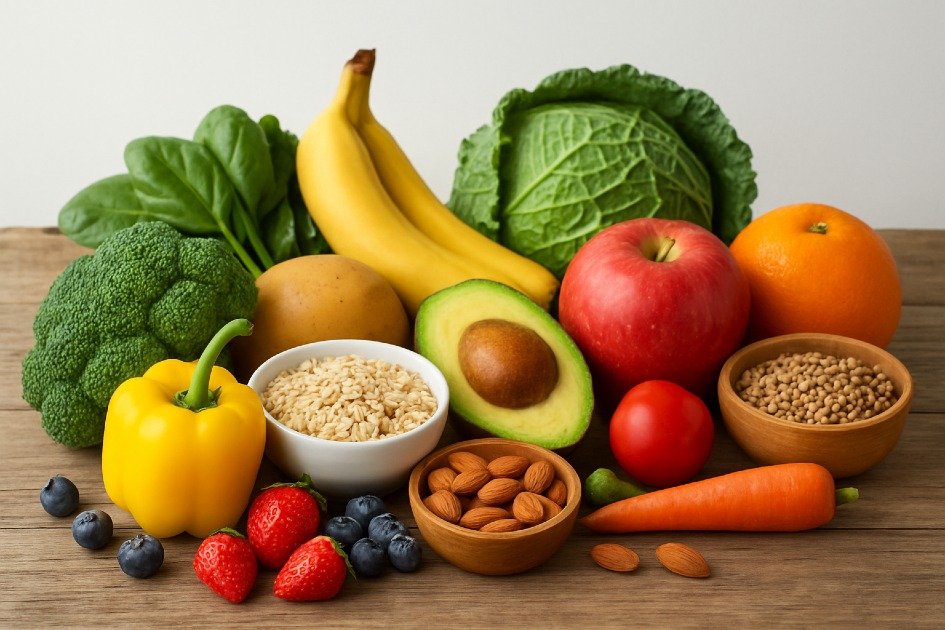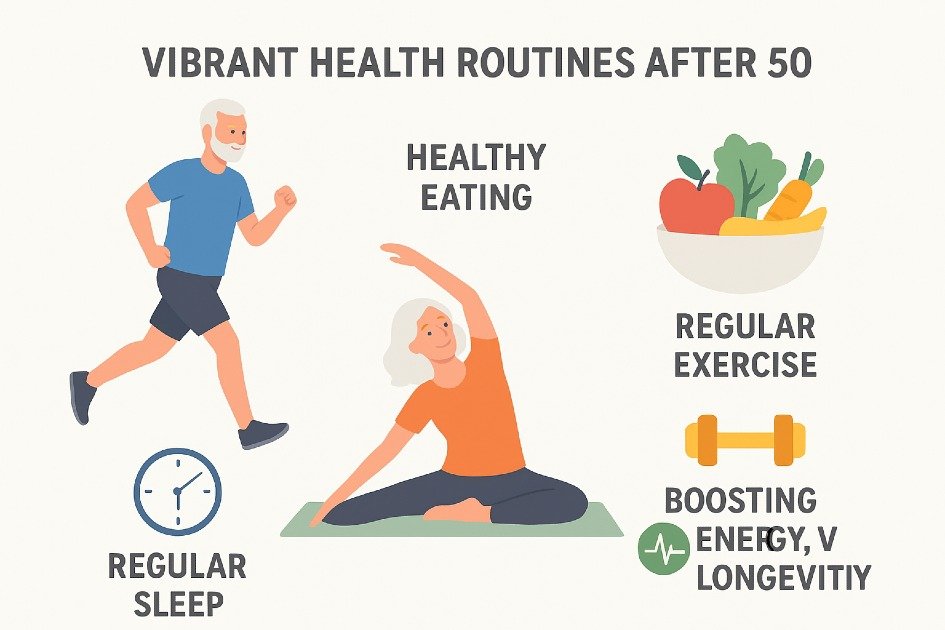Life after 50 is a time of momentous change, and a consistent routine is crucial for maintaining health and longevity.
By making small, intentional choices like stretching, nutrient-rich meals, and walking, you can build a foundation for longevity and avoid fatigue and imbalance.
Harvard Health highlights the challenge of obtaining adequate nutrients as we age, as our bodies absorb less nutrients but consume fewer calories, emphasizing the importance of nutrient-dense foods.
A well-crafted routine amplifies results without demanding extreme effort and encourages slowing down and listening to your body’s cues. It allows you to prioritize yourself and prioritize your health.
Starting small with a short stretch and a water bottle can make a difference, and gradually, your routine becomes the secret to feeling vibrant well past 50.

The Power of Daily Habits in Shaping Health
Health is not built in grand moments, but through daily choices, especially after 50, as the body responds differently and energy shifts. Creating intentional, health-driven habits can transform one’s life.
Why Small Choices Outweigh Big Efforts
After 50, chasing quick fixes like detox plans or supplements may not last long. Instead, steady, repeatable actions like skipping soda can significantly improve heart and waistline health.
Start with repeatable actions, like replacing an afternoon cookie with nuts or fruit, and gradually adjust your diet over time for sustainable progress.
I collaborated with a woman in her mid-fifties who thought only “big efforts” mattered. After months of strict diets, she felt tired and upset.
We replaced her perfection mindset with small daily habits—walking, eating mindfully, and stretching at night. In six months, her blood pressure went down, and she said, “My life feels slower, but in the best way.”
How Consistency Builds Momentum
Consistency is key in maintaining momentum, as it is built on daily routines, which provide structure and reduce decision fatigue.
Anchor healthy actions to existing routines, like brushing teeth and stretching before bed. Use habit trackers or fitness bands to monitor progress, emphasizing the journey rather than perfection.
I keep my yoga mat in the living room, always ready. Seeing it reminds me to stretch every day, even for just ten minutes. Staying consistent—not pushing hard makes my joints flexible and my mind calm.
Daily Habits as a Form of Preventive Medicine
Many people delay addressing health issues, ignoring distress signals. Daily habits like hydration, nutrition, movement, and rest serve as preventive medicine against lifestyle-related illnesses.
Regular exercise, such as a 20-minute walk after dinner, can help with digestion and blood sugar regulation, while a cup of green tea provides antioxidants and reduces processed snack cravings.
Harvard Health reports that individuals who adopt four or five healthy lifestyle habits at age 50, including a balanced diet, non-smoking, healthy weight, exercise, and alcohol moderation, have about a decade more disease-free year.
A close family member ignored her doctor’s advice to make small daily changes and relied only on medication. Her health got worse over time. Seeing that pushed me to stay consistent with my routines, meal-related and walking every day, which has kept me off prescriptions even in my fifties.
The Ripple Effect of One Simple Routine
Daily habits can be transformed by small actions like drinking more water, exercising, or waking up earlier for meditation, leading to improved sleep and reduced stress levels.
Stick to one anchor habit and gradually layer more, using tools like reusable water bottles or step-tracking smartwatches as daily prompts to create healthier patterns without constant mental effort.
I set one rule: drink a glass of water before each meal. It stopped me from overeating, kept me hydrated, and made my skin clearer. That small step quickly led to more healthy habits without much effort.

Morning Rituals That Set the Tone for Vitality
Wake-up routines are crucial for post-fifties individuals, as energy levels, sleep patterns, and joint stiffness change. A thoughtful routine can boost energy, focus, and promote healthier choices.
Energizing Stretches to Awaken Your Body
Over fifties often experience stiff muscles and sluggish circulation in the morning, making it challenging to feel prepared for the day.
Stretching for five minutes can boost blood flow and alleviate morning stiffness, with cat-cow stretches, shoulder rolls, and standing side bends being effective.
I began doing stretches in the morning when I noticed my back felt tight if I went straight to work. After a few weeks, my posture got better, and the stiffness went away quicker each day.
Hydration Hacks for Clearer Energy and Focus
Dehydration is common after sleep, especially as thirst signals weaken with age. This often results in fatigue, headaches, and brain fog.
Start your day with a tall glass of water, infuse with lemon or cucumber for a more enjoyable hydration experience, and use a large, insulated stainless steel bottle for easy access.
I replaced my morning coffee with warm lemon water. To my surprise, it gave me steady energy and no mid-morning crash.
Mindful Practices to Lower Morning Stress
Many people start their day by scrolling through emails or news, which can trigger stress and worry, affecting their entire mood throughout the day.
Replace mindless scrolling with mindful breathing, journaling, or gratitude practice, using apps like Mindful.org for short meditations and a gratitude journal for focus.
Writing three lines of gratitude each morning changed my outlook. Instead of stress, I began the day calm and steady.
Nourishing Your Morning with the Right Foods
A sugary breakfast can lead to energy spikes and crashes, making it challenging to maintain productivity.
Choose a protein-rich breakfast like Greek yogurt with berries, avocado toast, or a shake, and consider adding plant-based protein powder to your morning smoothie.
I once started my mornings with pastries. After switching to a protein smoothie, my energy stayed steady, and I stopped craving snacks an hour later.
Setting Intentions for the Day
Lack of clear direction can lead to distractions and unproductiveness, making it easy to lose focus and lose focus throughout the day.
To maintain focus and prevent overwhelm, take two minutes to list your top three priorities for the day, using tools like Evernote or a planner.
Writing my intentions became the heart of my mornings. When I skipped it, I felt lost. When I wrote them down, I moved through the day with focus and purpose.
Why a Consistent Routine Matters More Than Perfection
Consistent morning routines can transform one’s daily functioning, even for small rituals like stretching or setting intentions, even though no morning is perfect.

Fueling Your Body with Nourishing Foods
Over fifty, food choices can either drain energy or unlock vibrant health. Choosing the right foods fuels strength, sharpens focus, and supports longevity.
Balanced Meals That Support Longevity
After 50, many struggle to find satisfying and nutrient-rich meals, often skipping or relying on processed convenience foods, leading to energy crashes and sluggish digestion.
Balance lean protein, vegetables, and complex carbohydrates in a balanced plate, including grilled salmon, roasted sweet potatoes, and sautéed spinach, to maintain blood sugar, support muscle maintenance, and reduce cravings.
My afternoons felt clearer when I traded my sandwich and soda for a quinoa bowl with chicken and greens. Small food swaps can boost your energy.
You can also try omega-3 supplements or whole food multivitamins. They help fill the nutrition gaps that come with age.
Smart Snacking for Steady Energy
Hunger between meals often leads to quick fixation on sugary foods like chips, cookies, or drinks, causing blood sugar spikes and a crash, causing irritability and tiredness.
Create a snacking routine involving nuts, Greek yogurt, or apple slices with almond butter for energy stabilization and muscle health protein.
I carry a small jar of mixed nuts in my bag. It stops me from grabbing junk food when I am out. Keeping healthy snacks close makes a significant difference—it saves energy and willpower.
Keep snack packs ready to make healthy choices easy.
The Role of Protein, Fiber, and Healthy Fats
Over fifty, a lack of essential nutrients like protein, fiber, and healthy fats can hinder recovery, strength, digestion, cholesterol control, and brain function.
Include protein in every meal, including eggs, legumes, fish, poultry, whole grains, beans, leafy greens, and fats like avocado, olive oil, and walnuts.
Harvard Health suggests that adults who consume more dietary fiber, particularly from high-quality sources like whole grains, fruits, vegetables, and legumes, are more likely to age healthily and have better cognitive, physical, and mental function.
I switched from white bread to sprouted grain bread, and my digestion got better. These small swaps built a steady routine that keeps me energized and light on my feet.
Hydration as a Daily Ritual
Hydration is often overlooked in adults, leading to unnecessary snacking, fatigue, headaches, and poor concentration, often attributed to aging rather than lifestyle issues.
Start a hydration routine by drinking water daily, adding lemon or cucumber for refreshing and digestion support.
I saw my skin clear up and my headaches disappear after tracking my water each day for a few weeks. Drinking enough water is easy and brings big benefits.
Using an insulated water bottle helps me stay hydrated all day.
Creating Food Rituals That Stick
Consistency is key to a successful diet, as drastic changes may lead to relapse. Establishing food-related rituals becomes second nature, making the routine feel effortless.
Preparing meals in advance, keeping a grocery list, and batch-cooking on weekends can help reduce decision fatigue and simplify the process.
When I started prepping my lunches ahead of time, I saved money and avoided the stress of last-minute choices. This simple habit helped me eat healthier and feel calmer.
Use meal-prep containers to keep your food fresh and portions right.

Movement That Keeps You Strong and Flexible
Maintaining physical activity after 50 is crucial for independence, joint protection, and energy retention. Consistent, intentional exercise unlocks long-term strength and flexibility.
Low-Impact Exercises That Protect Your Joints
Joint discomfort is a major concern after 50, but low-impact activities like swimming, cycling, or walking can help maintain circulation without pounding stress.
A client of mine traded her daily jog for water aerobics. Within weeks, her hip pain eased, and she started enjoying her pool workouts more than she thought she would. Changing her routine helped her stick with it, which mattered more than working harder.
Use supportive shoes or resistance bands to make low-impact workouts even better.
Strength Training to Preserve Muscle and Bone Health
After 50, muscle mass declines rapidly, impacting balance, mobility, and bone density. Strength-based routines are crucial for combating frailty.
Start your fitness routine at home with bodyweight squats, wall push-ups, and light dumbbell exercises, without the need for a gym.
In my fifties, I started lifting weights twice a week. Gaining strength made me feel fitter and made daily chores, like carrying groceries, much easier.
If you are new to weightlifting, begin with adjustable dumbbells so you can increase weight slowly. Studies show that combining resistance exercise with enough protein helps keep your muscles strong.
Simple Mobility Routines That Enhance Daily Life
A daily mobility routine can enhance flexibility and reduce the risk of falls by keeping the body limber and reducing stiffness.
Every morning, I spend 10 minutes doing stretches, gentle twists, and hip openers. Soon, standing up from a chair or climbing stairs feels easier. I started a similar routine last year, and it has eased my lower back pain.
Use a yoga mat and follow a guided mobility flow.
Blending Movement into Everyday Routines
Making time for exercise is often the hardest part, and the solution is to incorporate movement into your daily routine.
Park at the far end of the lot. Take the stairs instead of the elevator. Do calf raises while brushing your teeth. These small movements may seem tiny, but they add up overtime, making you stronger and more energetic. I tell people to treat movement like brushing their teeth—it is part of the day, not optional.
A fitness tracker can help too. It reminds you to get up when you have been sitting too long. Little nudges like this keep you moving every day.
Why Movement Routines Keep You Thriving After 50
Aging involves smarter movement routines, protecting joints, preserving muscle, improving flexibility, and ensuring energized for life’s best moments.
When you move to protect your independence, exercise stops feeling like work and becomes a daily act of self-care. I have experienced it myself, and I have seen it in others: the habits you build today shape your life tomorrow.

Prioritizing Rest and Recovery
Vibrant health is not solely achieved through exercise and diet, but requires rest and recovery, especially after 50, to ensure optimal body repair and preparation.
Creating a Bedtime Routine for Deep, Restorative Sleep
Sleep quality is crucial for overall health, and a simple bedtime routine can improve it by dimming lights, sipping herbal tea, and avoiding screens.
Harvard Health suggests that restoring focus and clarity can be achieved by addressing sleep deprivation within a week, as prolonged sleep can delay recovery.
I found that swapping late-night TV for an enjoyable book helped me fall asleep faster and sleep longer.
A comfortable mattress and pillow make a significant difference too. Choosing a supportive mattress and adding breathable, cool sheets creates a cozy sleep environment.
The Link Between Rest and Hormone Balance
As we age, hormone fluctuations disrupt sleep cycles, leading to weight gain, fatigue, and mood swings. Maintaining natural balance through caffeine, daylight exposure, and consistent bedtime is crucial.
I used to wake up in the middle of the night, but adding a short walk in the evening changed that. The fresh air and gentle movement relaxed me and helped me sleep through the night. Small habits can make a significant difference.
How Rest Days Boost Energy and Prevent Burnout
Regular exercise is crucial for strengthening muscles and joints, but without recovery days, it can become a stressor rather than a strength-building tool.
When I added rest days to my daily workouts, my energy shot up. I stopped feeling tired and sore, and my exercises became stronger. Think of recovery as a boost that makes your results bigger. Even small tools like foam rollers help your muscles heal faster and hurt less.
Recovery Rituals You Can Start Today
- Take a quick 20-minute nap at noon to refresh your mind without feeling sleepy afterward.
- Eat magnesium-rich foods, such as leafy greens and nuts, to help your body relax.
- Use mindfulness apps to guide you through calming exercises before bedtime.
- Soak in a warm Epsom salt bath to relax your muscles and calm your mind.
Daily rituals aid in body transition from exertion to renewal, promoting clearer thinking, steady moods, and stamina for life beyond workouts.
Recap: Building a Lifestyle That Keeps You Thriving
A well-designed routine is essential for transforming your health, mindset, and outlook on life.
Consistent routines, such as stretching, nourishing breakfasts, and mindful breathing practices, provide stability and shield you from fatigue, chronic stress, and preventable illness.
A routine is more than a checklist; it directs energy towards what sustains you and away from distractions.
Start with one routine that feels natural, and invest in tools like fitness trackers or sleep aids to reinforce habits.
Remember that every routine you choose is a declaration of your health importance, and it is never too late to build a lifestyle that helps you thrive.
Frequently Asked Questions
What are the best exercises for someone over fifty with joint pain?
Low-impact activities like swimming, cycling, and walking can help alleviate joint discomfort and promote cardiovascular health. Combining these with yoga or tai chi enhances flexibility and stability. Online fitness programs offer tailored exercises.
How much protein should I eat daily after 50?
As we age, protein is crucial for muscle mass and bone integrity. Consume 1.0-1.2 grams per kilogram of body weight daily, incorporating plant-based proteins like lentils and chickpeas, and supplementing for variety.
Can routines really improve my mental health at this age?
Consistent routines like mindfulness, gratitude journaling, and breathing practice can reduce stress, increase emotional resilience, and create a more balanced state of mind, with guided meditation platforms being a helpful tool.
How do I stay motivated to stick with new habits?
Motivation fades, but momentum keeps you going. Start small, celebrate wins, and use accountability tools like habit-tracking communities or wearable trackers to keep going.
What small daily change makes the biggest difference in health after 50?
Hydration and restorative sleep are essential for overall health, impacting digestion, energy, skin elasticity, and cognitive clarity. Regular water intake and calming evening rituals can also enhance these benefits.

